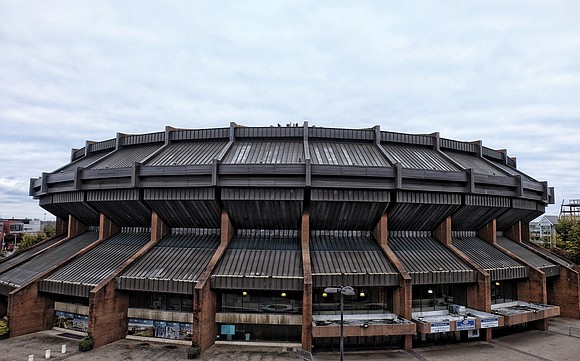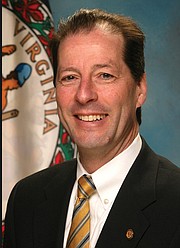Thumbs down
City Council-appointed advisory commission rejects $1.5B Coliseum and Downtown redevelopment plan after 3-month review
Jeremy M. Lazarus | 12/27/2019, 6 a.m.
Don’t do it.
Don’t invest hundreds of millions of taxpayer dollars to replace the vacant Richmond Coliseum with a new 17,500-seat arena.
That’s the bottom line recommendation from the Navy Hill Development Advisory Commission, a nine-member panel appointed by Richmond City Council to review the project.
That recommendation is headed to City Council following the commission’s three-month review of the massive $1.5 billion proposal pushed by Mayor Levar M. Stoney that would make a new Coliseum the city’s No. 1 priority, but also would generate about $1 billion in private development Downtown on city-owned property near City Hall.
The commission, by a 4-2 vote, found that the project as presented requires “an up-front commitment to the arena.”
But by a 5-2 vote, with two abstentions, “a majority of commissioners did not find the proposed, publicly financed $300 million arena a sound and reasonable public investment in the redevelopment of Downtown,” stated the final report, which was issued late Monday.
The finding is a clear repudiation of the viewpoint of Navy Hill District Corp. advocates that the investment would yield huge returns in jobs and tax revenues with little risk to the city.
By a 5-3 vote, the commission also rejected the city’s assertion that the project would not impact funding of the city’s public schools. Instead, the commission found the Navy Hill project, as the Coliseum replacement plan has been dubbed, “poses a risk to the city’s general fund and school funding,” with a portion of the commission concerned that the project also “poses a risk to other city businesses or programs.”
The commission members were appointed by City Council and led by former state Secretary of Transportation Pierce R. Homer. Its report will be formally presented to City Council on Monday, Jan 6.
The council also is awaiting the report of C.H. Johnson Consulting Inc., a Chicago firm hired by City Council to review the project. The consulting firm’s report would offer another view before the planned Feb. 24 vote to approve or kill the development that would be undertaken by the private Navy Hill District Corp. headed by Thomas F. Farrell II, the top executive at Dominion Energy.
The commission report is of little help to Mayor Stoney in his efforts to gain the required seven votes needed on City Council to sell city property for the $1.5 billion, mixed-use project. Along with a new Coliseum, the project would include a convention hotel, at least two new office buildings, more than 2,100 new apartments and multiple retail and restaurant operations in the area between 5th, 10th, Leigh and Marshall streets and in two city-owned blocks south of Broad Street.
As best as can be determined, four City Council members might vote for the project, with Council President Cynthia I. Newbille, 7th District, as the leading advocate.
Council members who have signaled they might vote against the project include Kim B. Gray, 2nd District; Council Vice President Chris A. Hilbert, 3rd District; Kristen N. Larson, 4th District; Stephanie A. Lynch, 5th District; and Reva M. Trammell, 8th District.
While he did not immediately issue a comment on the report, Mayor Stoney told the Free Press ahead of the report that the plan for “Navy Hill stands on its own merits” and that he remains optimistic that it will be approved.
“This project is now in the hands of City Council. My hope, my wish for 2020 is for my friends on council to articulate and verbalize ways we can strengthen this project. If they have concerns or issues, we need to hear about them because I do believe we can get to a yes, and we can create a compromise that can benefit an enormous number of people. At the end of the day, this is not about an arena. This project is not about buildings. This is about economic empowerment, this is about people. No is not a plan for success.”
Jeff Kelley, spokesman for the Navy Hill District Corp., stated that “we are not surprised that the commission has produced an inconclusive, fragmented … report.”
He noted the report repeatedly cited “insufficient information” in much of its analysis, “yet NH District Corp. has more than made itself available to provide as much information as needed, only to be seemingly disregarded.
“Further, the commission received factual, credible information from city staff, outside counsel and NH District Corp.,” Mr. Kelley continued. “It is contradictory to cite insufficient information yet find a concrete conclusion about ‘risks’ in the report.”
Going forward, Mr. Kelley said the corporation would work with City Council on any specific concerns.
“Our goal remains to be collaborative and to work with residents, council members and business leaders to create economic opportunity for all Richmonders” through this development, he stated.
Ms. Gray said the report’s conclusions lend support to her concern that the project would create a “doughnut hole” in the general fund by taking future growth in real estate taxes from an 80-block area of Downtown to pay for a new Coliseum and the borrowing associated with it.
Ms. Lynch found the conclusion of the report unsurprising based on her own research into the development. She said she could not vote to put major funding into a new Coliseum at a time when the city first needs to work on improving basic government operations, including its personnel and human resources operation, and its permits operation. “We have to do better,” she said.
Compiled by Mr. Homer, the commission report expressed several concerns in giving a thumbs-down on a new Coliseum, including that “as a regional facility, the region should provide financial support” rather than leaving the full cost to city taxpayers.
The report also stated that the “need for a 17,500-seat arena has not been established or verified.”
The minority on the commission believe the proposed $8 million investment from Spectra, the company hired to manage a new Coliseum if it is built, “is a measure of the likely success of the arena” and that the risks associated with the arena “could be mitigated by the success of the residential, retail, restaurant and lodging elements.”
In the report, the commission makes clear that despite the huge amount of information that was received and posted on its website, the members did not receive all the information needed.
For example, the commission stated members did not have enough information to determine if the project’s revenue projections were “appropriate and accurate” and listed 12 other points in which they did not have enough information.
In a separate section, individual commission members posted their own ideas about ways to improve the proposal, although the members recommending the improvements were not identified.
One post stated that the “the Navy Hill project is a bold and aspirational proposal hampered by the exclusion of key stakeholders in the planning. The result is a proposal supported by mediocre study and analysis.”
The city also was urged “to take a more incremental approach to ensure successful residential and commercial development first,” while another comment called for “the city to change the scope of the arena project so that its costs could be financed by a tax increment financing district the size of the 10-block project.”
The city also was urged to divide its property in the Navy Hill project area into parcels that could be offered to the highest bidder for individual development.
Along with Mr. Homer, commission members included Vice Chair John Gerner, Mark M. Gordon, Grindley R. Johnson, Suzanne S. Long, Dr. Hakim J. Lucas, Mary Harding Sadler, Michael J. Schewel and Dr. Corey D.B. Walker.
“In total, it results in a very interesting set of recommendations and findings that I think may be beneficial to the city,” Mr. Homer said at the commission’s final hearing Sunday.
The report found that the Navy Hill proposal includes positive elements, such as promoting a mixed-use project of residential and business activities and in laying out a minority business procurement initiative that would give African-American contractors a share of the work.
Mr. Homer said that every commissioner supports the redevelopment of this portion of Downtown. “We’re all just trying to get there in a fair and equitable way,” he said.








